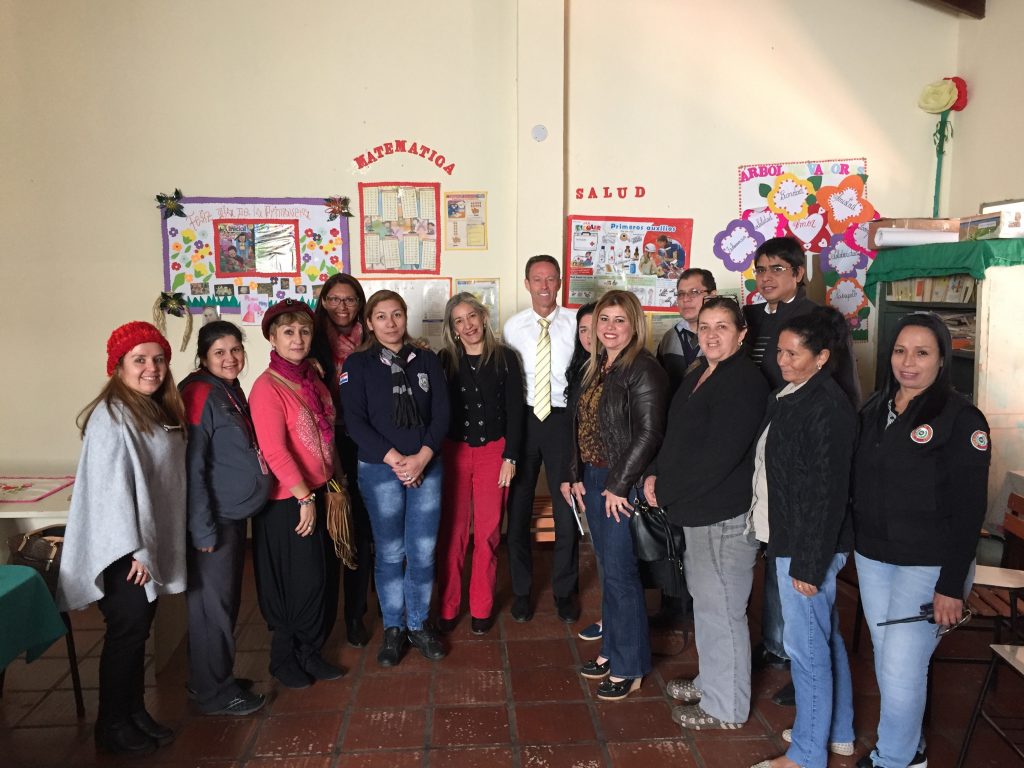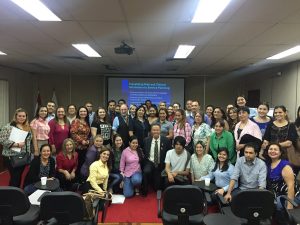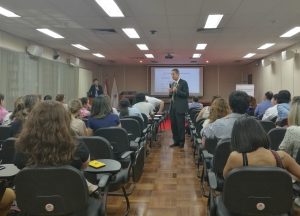-
What We Do
- WHERE WE WORK
-
About Us
 Welcome Message from Carol Jenkins
Welcome Message from Carol JenkinsFor more than 90 years, World Learning has equipped individuals and institutions to address the world’s most pressing problems. We believe that, working together with our partners, we can change this world for the better.
On my travels, I’ve had the opportunity to meet with many of those who have joined us in this mission. In Baghdad, we’ve trained more than 2,300 Iraqi youth who are already giving back at home. In London, our partners in the TAAP Initiative strongly believe that we are all responsible to practice inclusion. And in Vermont, our Experiment in International Living and School for International Training participants prove every day that they have the tools and the determination to change the world.
Please join us in our pursuit of a more peaceful and just world.
- Get Involved
Media Center > Story
How a Partnership Formed Through the Fulbright Specialist Program is Tackling Substance Use Disorders in the U.S. and Paraguay
November 15, 2019

When the Universidad Católica (UC) “Nuestra Señora de la Asunción” in Paraguay decided to expand its class offerings, the Director of UC’s Psychology Department Dr. Diana Lesme Romero saw an opportunity to include a concentration in substance use disorders.
As a former drug counselor for a local NGO, Lesme Romero understood that mental health professionals around the country would benefit from specialized coursework in addressing this problem.
“It was not a topic being discussed at the academic level,” she explains, adding, “there wasn’t a single course in the field at the university level.”
She attended a conference organized by the International Center for Credentialing and Education of Addiction Professionals (ICCE) and the U.S. Department of State’s Bureau of International Narcotics and Law Enforcement Affairs (INL).
Attendees from around the world met to discuss the development of undergraduate and graduate addiction studies programs, incorporating the Universal Treatment Curriculum (UTC) and similar standardized evidence-based training materials.
There she met Dr. Roger Peters, a professor at University of South Florida’s (USF) Department of Mental Health Law and Policy, a licensed psychologist, and expert in substance use disorders who also serves as director of the UTC Coordinating Center for North American Universities.
Lesme Romero knew he was the perfect person to help her bring high-quality academic training in drug addiction studies to Paraguay.
Through Peters, a candidate on the Fulbright Specialist Program Roster, Lesme Romero learned that she could submit a proposal to bring him to Paraguay to advise, lecture, and offer training.
“As in many countries, there aren’t advanced training programs for addiction treatment professionals in Paraguay,” explains Peters, who believes using the UTC, a model implemented successfully in other countries, is an important step.

Peters admits he didn’t know much about Paraguay — a landlocked South American country moving from decades of isolation and dictatorship to civilian leadership and democratic transition — but was excited to work in a place that was rebuilding itself.
“It seemed like a great opportunity to work with someone like-minded who had already done so much with few resources.”
During his three-week visit, Peters held meetings with faculty about using UTC in academic programs, best practices for training and mentorship, and potential opportunities for exchange between UC and USF.
He also delivered over a dozen workshops, training sessions and presentations for addiction treatment staff at the National Addictions Control Center, National Anti-Drug Secretariat, National Psychiatric Hospital, as well as residential youth treatment centers.
As a result, local staff gained an understanding of evidence-based treatment practices for addiction. They also improved screening and assessment protocols and learned about designing studies of treatment outcomes.
Says Peters: “I was impressed by the commitment of colleagues in Paraguay to embrace new ideas to enhance programmatic services and to build more comprehensive systems of care for persons who have mental and substance disorders.”
He also introduced the UTC to academics and mental health professionals working in the field of addiction, which had been largely unavailable in Paraguay and South America. Now, there are three universities in Asunción using UTC.
Peters’ shared his expertise in substance abuse prevention through radio and television interviews at the Secretaria Nacional Antidrogas de Paraguay — Paraguay’s equivalent of the U.S. Drug Enforcement Administration — and met with top officials there.
The Fulbright Specialist Program helped Peters and Lesme Romero solidify their partnership. After working together, Peters encouraged Lesme Romero to join the Board of Directors for the International Consortium of Universities for Drug Demand Reduction (ICUDDR), a network of universities engaged in training, research, outreach, and advocacy around the treatment and prevention of substance use disorders. Peters currently serves as its Vice President.
This summer, the two connected again in-person for the 4th annual ICUDDR conference.
They will soon collaborate on research examining treatment needs and alternatives to incarceration among substance-involved women in the justice systems in both Paraguay and the United States.
Through a University Nexus Initiative (UNI) Award from the University of South Florida, Peters’ and Lesme Romero’s teams will investigate the need for substance abuse treatment among incarcerated women in both countries and identify strategies for diverting them to community-based treatment programs.

“It is very expensive to incarcerate non-dangerous female prisoners who could be treated more effectively in community-based settings, where there are a range of treatment-based options available, and where they can remain as productive citizens via employment and involvement with family, church, and other prosocial activities,” says Peters.
The project will also provide technical assistance to correctional authorities in both countries that will help identify strategies for diverting female prisoners to community treatment programs.
Upon completing their research, Peters and Lesme Romero plan to share their findings through colloquia and develop a new course called “Substance Abuse and the Justice System.”
Lesme Romero says hosting a Fulbright Specialist was personally and professionally rewarding.
The program not only provided an opportunity to reconnect with colleagues doing addiction prevention work, but widened her network of professional contacts in Paraguay and internationally.
Building on Peters’ visit, she has been working to increase the number of students familiar with the UTC and offered the first-ever Training of Trainers at UC.
“We now have 11 accredited trainers, who are teaching courses at the university level,” she says.
For his part, Peters says his Fulbright experience equipped him with new insights and connections with academics and drug enforcement officials, enabling him to expand his research. He will return in March 2020 for fieldwork with Lesme Romero and her team.
Back at USF, Peters has been able to incorporate examples of how evidence-based treatment practices can be implemented in a developing country context into student modules on international approaches to addiction treatment. Peters draws on his observations as a Specialist to discuss the nuances and challenges countries like Paraguay may face, such as limited opportunities for training and a lack of Spanish-language resource materials.
Peters also says the Fulbright experience and growing collaboration has much broader implications.
“Reducing drug demand in other countries has an impact on preventing export of illicit drugs, and could reduce the inflow of drugs to the United States,” he explains.
The Fulbright Specialist Program was established in 2001 by the U.S. Department of State and the Bureau of Educational and Cultural Affairs (ECA) to enable U.S. professionals and scholars to work on short-term projects overseas in conjunction with local host institutions.
For more information about the Fulbright Specialist Program or to apply, please go to: https://fulbrightspecialist.worldlearning.org/the-fulbright-specialist-program/





